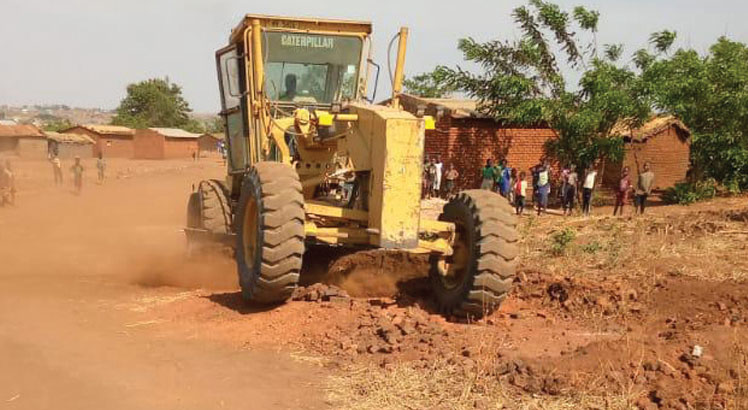Govt, communities land disputes persist
In Area 55, a settlement on the outskirts of Lilongwe, a heavy machinery is grading part of the earth road network that snakes around settlements comprising old, dirty and tiny homes and newly constructed townhouses.
Developers of these houses, who are settling in the area after buying land there, are the ones funding the road upgrading project. Their multi-million kwacha investments, however, may well turn out to be fruitless as government is planning to displace them.
“This is public land, therefore, it belongs to government. We will compensate those who will be affected by the displacement,” said Lilongwe District Council land officer James Mwenda.
On that land that stretches into swathes of hectarage, Malawi Investment and Trade Centre (Mitc) is planning to build a shopping centre.
While the council says the site is designated as public land, the settlers argue that it is customary land inherited from their ancestors.
Last week, Nation on Sunday established that the residents ganged up and chased surveyors and valuers assigned to evaluate their compensation.

This land dispute is one of many involving the State, communities and companies, with analysts criticising government for failing to put in place measures to address the conflicts and stop, at early stages, developers from constructing in restricted places.
Total LandCare Malawi country director Zwide Jere attributes the land wrangles to failure by authorities to sensitise the public on restricted areas where they are not supposed to buy land and construct houses.
He said: “The whole town should be planned and zoned. If it is already, then government has not done enough to sensitise people as to which land is under customary and public.
“Again, the land authorities have not been enforcing mechanisms that would stop developments, at early stages, to avert conflicts that arise when houses and other projects are fully completed.”
Moving forward, Jere asked government to find a way to legitimise some settlements instead of demolishing the buildings.
He said by failing to legitimise some settlements, government was losing out as it cannot collect ground rentals from the landlords it deems illegal.
Jeer’s sentiments cement a study on Land Sector Governance in Malawi released in 2013 which found that most urban settlers were not processing full land ownership because of the expensive processes they are subjected to.
“Full legal recognition of urban land tenure is hampered by obstacles such as rapid urbanisation the requirements of formal title registration, and the high cost of legal fees for formalisation.
Meanwhile, Minister of Lands Kezzie Msukwa agreed with Jere that government is failing to stop projects on restricted land.
He said: “The city and district councils are supposed to enforce regulations and ensure that all those carrying out constructions have obtained permission from my ministry.”
On the Area 55 land reclamation push, the minister said he was involved in reasoning with the settlers to surrender their land to government.
He explained: “Since there are some people clinging to that land, we will have to go back to the drawing board and find a solution.”
The Land Act points out that customary land may be assigned to a lineage, family, or individual, and the rights can be transferred to heirs. Government, however, has legal power to convert customary land into private leasehold or public land.
Public land is owned and used by government, according to the law, and also includes land that is leased to individuals, companies and institutions for which ground rent is paid to government.
One of the developers in the Area 55 disputed land, Anderson Masina, said he bought the land with the approval of a chief after establishing that it was customary.
“We even asked the Ministry of Lands to issue us title deeds and responsible officers there expressed willingness to do that. They advised us that we need to develop the site before we get the deeds. Why did government not stop us then?” he quizzed.
Masina, who claimed to have constructed two houses worth millions of kwacha, further said he has no problem abandoning the area as long as he is fully compensated.
Area 55, popularly known as Magwero, lies about 20 kilometres north of Lilongwe City.
Meanwhile, Mitc public relations manager Deliby Chimbalu in an interview on Friday said they plan to construct an industrial park on the disputed land.
She said: “It will have manufacturing hub, an agro-processing hub, a logistics hub, an ICT centre, a recreation centre and residential apartments.”





